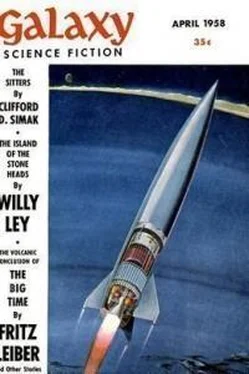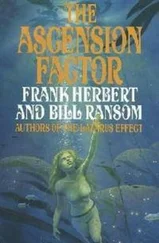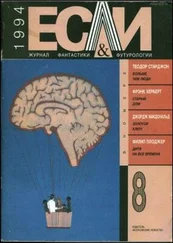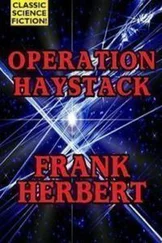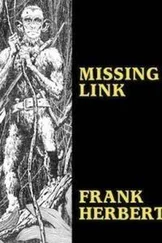Old Rambling House
Frank Herbert
All the Grahams Desired Was a Home They Could Call Their Own … but What Did the Home Want?
On his last night on Earth, Ted Graham stepped out of a glass–walled telephone booth, ducked to avoid a swooping moth that battered itself in a frenzy against a bare globe above the booth.
Ted Graham was a long–necked man with a head of pronounced egg shape topped by prematurely balding sandy hair. Something about his lanky, intense appearance suggested his occupation: certified public accountant.
He stopped behind his wife, who was studying a newspaper classified page, and frowned. "They said to wait here. They'll come get us. Said the place is hard to find at night."
Martha Graham looked up from the newspaper. She was a doll–faced woman, heavily pregnant, a kind of pink prettiness about her. The yellow glow from the light above the booth subdued the red–auburn cast of her ponytail hair.
"I just have to be in a house when the baby's born," she said. "What'd they sound like?"
"I dunno. There was a funny kind of interruption—like an argument in some foreign language."
"Did they sound foreign?"
"In a way." He motioned along the night–shrouded line of trailers toward one with two windows glowing amber. "Let's wait inside. These bugs out here are fierce."
"Did you tell them which trailer is ours?"
"Yes. They didn't sound at all anxious to look at it. That's odd—them wanting to trade their house for a trailer."
"There's nothing odd about it. They've probably just got itchy feet like we did."
He appeared not to hear her. "Funniest–sounding language you ever heard when that argument started—like a squirt of noise."
* * * * *
Inside the trailer, Ted Graham sat down on the green couch that opened into a double bed for company.
"They could use a good tax accountant around here," he said. "When I first saw the place, I got that definite feeling. The valley looks prosperous. It's a wonder nobody's opened an office here before."
His wife took a straight chair by the counter separating kitchen and living area, folded her hands across her heavy stomach.
"I'm just continental tired of wheels going around under me," she said. "I want to sit and stare at the same view for the rest of my life. I don't know how a trailer ever seemed glamorous when—"
"It was the inheritance gave us itchy feet," he said.
Tires gritted on gravel outside.
Martha Graham straightened. "Could that be them?"
"Awful quick, if it is." He went to the door, opened it, stared down at the man who was just raising a hand to knock.
"Are you Mr. Graham?" asked the man.
"Yes." He found himself staring at the caller.
"I'm Clint Rush. You called about the house?" The man moved farther into the light. At first, he'd appeared an old man, fine wrinkle lines in his face, a tired leather look to his skin. But as he moved his head in the light, the wrinkles seemed to dissolve—and with them, the years lifted from him.
"Yes, we called," said Ted Graham. He stood aside. "Do you want to look at the trailer now?"
Martha Graham crossed to stand beside her husband. "We've kept it in awfully good shape," she said. "We've never let anything get seriously wrong with it."
She sounds too anxious , thought Ted Graham. I wish she'd let me do the talking for the two of us.
"We can come back and look at your trailer tomorrow in daylight," said Rush. "My car's right out here, if you'd like to see our house."
Ted Graham hesitated. He felt a nagging worry tug at his mind, tried to fix his attention on what bothered him.
"Hadn't we better take our car?" he asked. "We could follow you."
"No need," said Rush. "We're coming back into town tonight anyway. We can drop you off then."
Ted Graham nodded. "Be right with you as soon as I lock up."
Inside the car, Rush mumbled introductions. His wife was a dark shadow in the front seat, her hair drawn back in a severe bun. Her features suggested gypsy blood. He called her Raimee.
Odd name , thought Ted Graham. And he noticed that she, too, gave that strange first impression of age that melted in a shift of light.
Mrs. Rush turned her gypsy features toward Martha Graham. "You are going to have a baby?"
It came out as an odd, veiled statement.
Abruptly, the car rolled forward.
Martha Graham said, "It's supposed to be born in about two months. We hope it's a boy."
Mrs. Rush looked at her husband. "I have changed my mind," she said.
Rush spoke without taking his attention from the road. "It is too … " He broke off, spoke in a tumble of strange sounds.
Ted Graham recognized it as the language he'd heard on the telephone.
Mrs. Rush answered in the same tongue, anger showing in the intensity of her voice. Her husband replied, his voice calmer.
Presently, Mrs. Rush fell moodily silent.
Rush tipped his head toward the rear of the car. "My wife has moments when she does not want to get rid of the old house. It has been with her for many years."
Ted Graham said, "Oh." Then: "Are you Spanish?"
Rush hesitated. "No. We are Basque."
He turned the car down a well–lighted avenue that merged into a highway. They turned onto a side road. There followed more turns—left, right, right.
Ted Graham lost track.
They hit a jolting bump that made Martha gasp.
"I hope that wasn't too rough on you," said Rush. "We're almost there."
* * * * *
The car swung into a lane, its lights picking out the skeleton outlines of trees: peculiar trees—tall, gaunt, leafless. They added to Ted Graham's feeling of uneasiness.
The lane dipped, ended at a low wall of a house—red brick with clerestory windows beneath overhanging eaves. The effect of the wall and a wide–beamed door they could see to the left was ultramodern.
Ted Graham helped his wife out of the car, followed the Rushes to the door.
"I thought you told me it was an old house," he said.
"It was designed by one of the first modernists," said Rush. He fumbled with an odd curved key. The wide door swung open onto a hallway equally wide, carpeted by a deep pile rug. They could glimpse floor–to–ceiling view windows at the end of the hall, city lights beyond.
Martha Graham gasped, entered the hall as though in a trance. Ted Graham followed, heard the door close behind them.
"It's so—so—so big ," exclaimed Martha Graham.
"You want to trade this for our trailer?" asked Ted Graham.
"It's too inconvenient for us," said Rush. "My work is over the mountains on the coast." He shrugged. "We cannot sell it."
Ted Graham looked at him sharply. "Isn't there any money around here?" He had a sudden vision of a tax accountant with no customers.
"Plenty of money, but no real estate customers."
They entered the living room. Sectional divans lined the walls. Subdued lighting glowed from the corners. Two paintings hung on the opposite walls—oblongs of odd lines and twists that made Ted Graham dizzy.
Warning bells clamored in his mind.
* * * * *
Martha Graham crossed to the windows, looked at the lights far away below. "I had no idea we'd climbed that far," she said. "It's like a fairy city."
Mrs. Rush emitted a short, nervous laugh.
Ted Graham glanced around the room, thought: If the rest of the house is like this, it's worth fifty or sixty thousand . He thought of the trailer: A good one, but not worth more than seven thousand .
Uneasiness was like a neon sign flashing in his mind. "This seems so … " He shook his head.
"Would you like to see the rest of the house?" asked Rush.
Читать дальше
